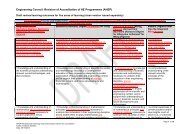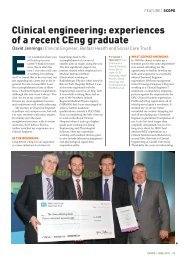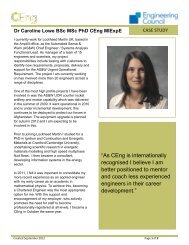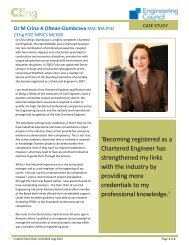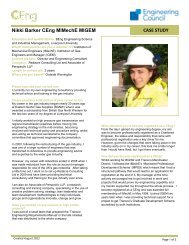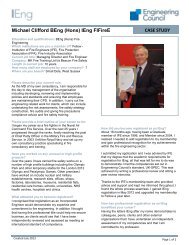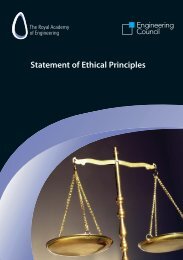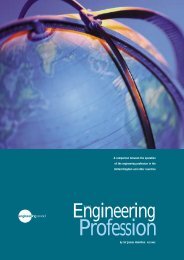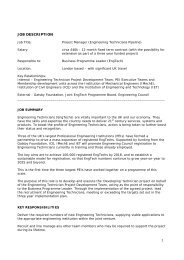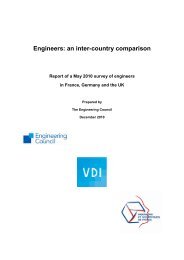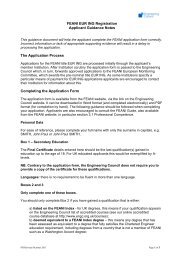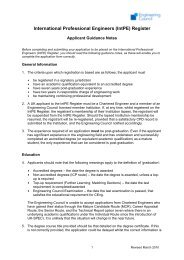An Engine for Change - A Chronicle of the Engineering Council
An Engine for Change - A Chronicle of the Engineering Council
An Engine for Change - A Chronicle of the Engineering Council
Create successful ePaper yourself
Turn your PDF publications into a flip-book with our unique Google optimized e-Paper software.
92A CHRONICLE OF THE ENGINEERING COUNCILInterfacing with SchoolsIn <strong>the</strong> period 1991-1995 considerable and sustained progress was made in <strong>the</strong> field <strong>of</strong>schools’ liaison under <strong>the</strong> auspices <strong>of</strong> <strong>the</strong> EngC’s Board <strong>for</strong> Industry and Regions operatingthrough its General Education Committee.‘<strong>Engine</strong>ering Equals <strong>for</strong> Primary Schools’ was published in January 1991 and <strong>the</strong> results <strong>of</strong> anational survey ‘Gender, Primary Schools and <strong>the</strong> National Curriculum’ were published inMay 1991 by <strong>the</strong> EngC jointly with <strong>the</strong> National Association <strong>of</strong> School Masters and <strong>the</strong>Union <strong>of</strong> Women Teachers; <strong>the</strong>se results showed that <strong>of</strong> 256 boys and 247 girls aged five, carrepairs and woodwork were judged to be <strong>the</strong> province <strong>of</strong> men while mending and washingclo<strong>the</strong>s remained <strong>the</strong> domain <strong>of</strong> women – in o<strong>the</strong>r words, 5 year olds in 1991 had <strong>the</strong> sameperceptions as <strong>the</strong>ir parents and grandparents. Among <strong>the</strong> survey’s recommendations were <strong>for</strong>more people with good science qualifications to teach <strong>the</strong> youngest children.In supporting school educational re<strong>for</strong>m in 1991, <strong>the</strong> EngC helped develop many projects andactivities. These included <strong>the</strong> Technical and Vocational Educational Initiative (TVEI),science and technology curricula, teacher supply, YEB, WISE, Opening Windows on<strong>Engine</strong>ering and <strong>the</strong> Neighbourhood <strong>Engine</strong>ers’ scheme. The EngC also evolved a structure<strong>of</strong> industry-based standing conferences to develop occupational standards leading to NVQs.This work was coordinated by <strong>the</strong> EOSG, its secretariat co-located with EngC staff.During 1991 <strong>the</strong> EngC again commissioned Pr<strong>of</strong>essor Alan Smi<strong>the</strong>rs and Dr PamelaRobinson from Manchester University School <strong>of</strong> Education. This time <strong>the</strong> purpose was toresearch <strong>the</strong> impact <strong>of</strong> local management <strong>of</strong> schools and <strong>of</strong> <strong>the</strong> National Curriculum onpreviously known strategies <strong>of</strong> ma<strong>the</strong>matics and physics teachers. The results, reported in‘Staffing Secondary Schools in <strong>the</strong> Nineties’ in that August, revealed <strong>the</strong> concern from headteachers over never-ending modifications to <strong>the</strong> National Curriculum and a continuing staffshortfall in both technology and modern languages. This was a saga with a long history and along future!The EngC had joined <strong>the</strong> Teaching AS a Career (TASC) unit - a joint initiative <strong>of</strong> <strong>the</strong> DESand two local authority associations - to encourage young people to develop practical skills,knowledge and understanding. Consequently, a brochure ‘Your Future in TechnologyTeaching’ was published in January 1991, aimed to help recruit more technology teachers.Michael Fallan, Parliamentary Under Secretary <strong>of</strong> State at <strong>the</strong> DES who launched this bookletsaid “I wholeheartedly support this example <strong>of</strong> cooperation between The <strong>Engine</strong>ering<strong>Council</strong> and TASC. Technology is crucially important to <strong>the</strong> economic future <strong>of</strong> <strong>the</strong> countryand such initiatives to recruit good quality candidates into teacher training are to bewelcomed”.A one-day conference was organised in 1991 by <strong>the</strong> EngC, <strong>the</strong> Association <strong>of</strong> Advisers inCraft Design and Technology and The Staff College, to provide an awareness <strong>of</strong> <strong>the</strong>possibilities <strong>of</strong>fered by A and AS level technology courses. The EngC commissionedresearch into key issues facing technology in <strong>the</strong> National Curriculum; <strong>the</strong> results werepublished in May 1992 in a report (partly sponsored by BP) concluding that <strong>the</strong> NationalCurriculum technology was “a mess”. <strong>An</strong> eight-point rescue plan was put <strong>for</strong>ward. JohnPatten, Secretary <strong>of</strong> State <strong>for</strong> Education, speedily announced an urgent review (which wascompleted in December 1992) <strong>of</strong> <strong>the</strong> Technology Order but in August <strong>the</strong> EngC produced‘The revision <strong>of</strong> National Curriculum technology’, followed in September by ‘Technology at© <strong>Engine</strong>ering <strong>Council</strong> UK 2004



